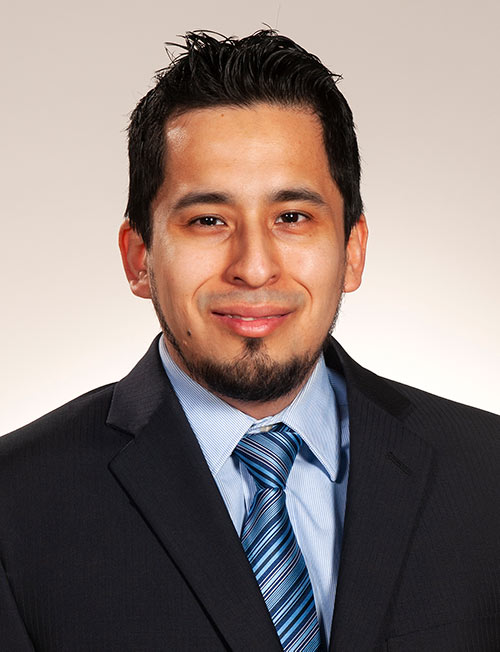Neuromuscular Disease Therapy Research
David Garcia-Castro (DO/PhD '23)
January 13, 2022 David Garcia-Castro (DO/PhD '23) is an aspiring physician-scientist, currently in
his third year of medical school, performing clinical rotations. He recently defended his doctoral research dissertation
at Philadelphia College of Osteopathic Medicine (PCOM). Mr. Garcia-Castro received his bachelor of science in biomedical science from Northern Arizona University in 2012 and worked in research and development in
infectious disease diagnostic assay production from 2013-2016.
David Garcia-Castro (DO/PhD '23) is an aspiring physician-scientist, currently in
his third year of medical school, performing clinical rotations. He recently defended his doctoral research dissertation
at Philadelphia College of Osteopathic Medicine (PCOM). Mr. Garcia-Castro received his bachelor of science in biomedical science from Northern Arizona University in 2012 and worked in research and development in
infectious disease diagnostic assay production from 2013-2016.
What are you studying?
Spinal and bulbar muscular atrophy (SBMA, Kennedy’s Disease) is a debilitating, neuromuscular
disease that causes muscle weakness and atrophy, leading to loss of mobility. To date,
no therapy exists to halt SBMA progression. Mitochondrial and metabolic dysfunction
are critical pathologic features of SBMA pathology and may serve as a target for therapeutic
intervention. The goals of this study were twofold: 1) to enhance mitochondrial and
metabolic health in SBMA, and 2) to characterize a novel high-throughput in vivo model
of SBMA to help screen potential therapeutics.
What prompted you to pursue research?
Research has always been my passion alongside medicine. I was introduced to research
in 2009 when I joined my first undergraduate research lab and studied the role of
the APOE gene in Alzheimer’s disease. It was a brief introduction to research but
I found that I enjoyed looking at the big picture of disease pathogenesis, how finding
opens up new avenues of research and how research moves the field down pathways to
potential therapies. When I graduated in 2012, I continued my research work in the
biotechnology field where I was able to work side-by-side with research professionals
in both human and veterinary infectious disease diagnostics. I was very fortunate
and thoroughly enjoyed being at the forefront of diagnostic point-of-care nucleic
acid amplification technology development. When I returned to medicine, I chose this
dual-degree program, which has allowed me to train in both basic science research and in clinical medicine.
Please provide a synopsis of your research experience.
Using in-vitro and in vivo models of SBMA, we targeted a major mitochondrial enzyme,
which regulates mitochondrial functions and provides anti-oxidative defense. Within
SBMA models, the activation and over-expression of this enzyme decreased reactive
oxygen species (ROS), reduced cell death and increased muscle mass. However, the enzyme
by itself did not rescue motor dysfunction. Therefore, we repurposed a previously
FDA-approved drug to increase the enzyme function. With this drug, we were able to
restore motor function with concurrent enzyme over-expression. Additionally, we are
also developing a more high-throughput in vivo SBMA model to screen for therapeutics
that could be of benefit in mammals.
Where did you conduct this research?
This research was conducted at PCOM in Philadelphia, under the advisory of Heather Montie, PhD. The Cell and Molecular Biology PhD program, within the University of the Sciences
further supported my academic PhD training. This work was supported by the CCDA, DOR,
and the DO/PhD program (Giunta Family Research Scholarship to DGC) at PCOM, the Kennedy’s
Disease Association (to HLM), and R03NS104607 from the NIH (to HLM).
What were your responsibilities in this research project?
I worked on this research project for three years during my PhD dissertation, and
continue to take part in it during my clinical rotations. I was involved in troubleshooting
assays, running experiments, developing research protocols, presenting research and
writing my thesis and research manuscripts.
What is the broader impact of your research?
SBMA is a trinucleotide repeat neuromuscular disease that shares many aspects of pathology
with other neurodegenerative diseases such as ALS, Huntington’s disease and Parkinson’s
disease. Our research has identified a potential and novel therapeutic approach for
SBMA, which may also be relevant to other areas of neurodegenerative and muscular
atrophy research. Additionally, our work to generate a high-throughput in vivo assay
will help to further support therapeutic development for SBMA.
About Philadelphia College of Osteopathic Medicine
Established in 1899, Philadelphia College of Osteopathic Medicine (PCOM) has trained
thousands of highly competent, caring physicians, health practitioners and behavioral
scientists who practice a “whole person” approach to care—treating people, not just
symptoms. PCOM, a private, not-for-profit accredited institution of higher education,
operates three campuses (PCOM, PCOM Georgia and PCOM South Georgia) and offers doctoral degrees in clinical psychology, educational psychology, osteopathic
medicine, pharmacy, physical therapy, and school psychology. The college also offers
graduate degrees in applied behavior analysis, applied positive psychology, biomedical
sciences, forensic medicine, medical laboratory science, mental health counseling,
physician assistant studies, and school psychology. PCOM students learn the importance
of health promotion, research, education and service to the community. Through its
community-based Healthcare Centers, PCOM provides care to medically underserved populations.
For more information, visit pcom.edu or call 215-871-6100.
Contact Us
For general media inquiries, please contact the Office of Marketing and Communications
at 215-871-6300 or communications@pcom.edu. Visit our media relations page to view contact information for public relations personnel.
Connect with PCOM

 David Garcia-Castro (DO/PhD '23) is an aspiring physician-scientist, currently in
his third year of
David Garcia-Castro (DO/PhD '23) is an aspiring physician-scientist, currently in
his third year of 